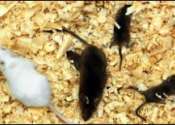In mice, experimental drug treatment for Rett syndrome suggests the disorder is reversible
A team at Cold Spring Harbor Laboratory (CSHL) has developed a strikingly new approach for treating Rett syndrome, a devastating autism spectrum disorder (ASD) that affects 1 in 10,000 people in the US, mostly girls. In a ...
Jul 27, 2015
0
648







